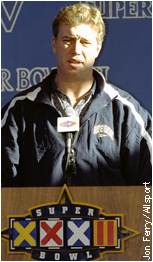"Show me a TV reporter doing a piece on the wackiness of Media Day at the Super Bowl, and I'll show you a radio reporter of the future. Or someone working in radio repair."
Yes, Media Day descends upon us Tuesday morning, a perennial example of nitwittery based on the proposition that one long shot and a talking head telling us how silly we reporters look as we submit to an interview opportunity disguised as Family Day at the abattoir makes for riveting television.
There have been enough examples of Media Days gone wrong in the past -- the touching request of Doug Williams to explain how long he has been a black quarterback, the desire for detail that prompted one man to ask Jim Plunkett whether he had a blind mother and dead father or vice versa -- that they have become as much a part of Super Bowl lore as Jim McMahon airing his hindquarters at a hovering news helicopter.
But those were the innocent times, when the Super Bowl was merely bloated beyond recognition, and not as it is today, a cheap open-air stage for exhibitionists of every stripe to swipe a moment of attention for themselves. Downtown Julie Brown for MTV ... the PGA Tour member boring us with tales of golfing football players for the Golf Channel ... Beth Littleford of The Daily Show ... the Broncos' offensive linemen breaking their self-imposed silence under pain of fine, and then talking for the better part of 75 minutes about not talking.
In the good old days, when the problem was too many reporters for not enough stories, Media Day was just another telegenic example of Super Bowl excess, a game gone way too big for its britches. Now, Media Day is an example of marketing, product positioning, and out-and-out posing.
In all, another grand tradition ruined. But all in keeping with the development of the Super Bowl from a football game with commercial possibilities to a trade show with a football game tagged onto the end.
There was indeed a sort of brainless innocence to the earnestly delivered stupid question, a groping for the brilliant inquiry that turns on a moment's syntactical foul-up into a disaster for the ages. You could tell by the blank look on the player's face, the wide-eyed fear of the questioner, and then the stammer in search of a way to ask the question that could save the moment and avoid decades of embarrassment.
Now, the idea is to ask the stupid question with a knowing smirk. Occasionally, it works, as it has with Biff Henderson of the Letterman show, or Littleford last year. Mostly, though, it reeks of force and lameness -- taking a tedious situation and enhancing it with devastating unfunniness.
Concomitantly, the idea for players is to serve as paid advertisements on the hoof (like the Broncos and their ubiquitous EAS hats), to push pet projects or to feign contempt for their surroundings. Watching Green Bay's Gilbert Brown affect outrage at being asked questions about his weight after spending the previous 18 months cashing in, albeit modestly, on his size was enough for even the most hardened of observers to wonder where all the good-natured idiocy had gone.
In short, Media Day has lost its ability to amuse. It never had an ability to elucidate, educate or even entertain all that much, but it could be played for laughs by the extremely clever, the stunningly naive, or the momentarily confused. In a weird way, asking someone to straighten out his familial tragedies on the fly is funny. And Doug Williams always seemed to understand the intended implications of the black quarterback question, even if the question came out so preposterously.
Media Day still has a purpose -- putting a thousand journalists with their favorite three or four subjects and getting copy churned out to hype the whirlwind. The league gets what it wants (publicity without the troublesome ad rates), the papers get what they want (their own bylines on the same old stories), the teams get what they want (limited and controlled access).
And the TV stations get what they apparently want -- another turgid two-minute tale of American sporting journalism on the hoof. Oooh, look at 'em ask stuff. Oooh, look at 'em mill about. Oooh, look at 'em cue up for food. Boy, isn't this great stuff? Oughta play ahead of the impeachment trial.
Well, on that last one, they may have something.
Ray Ratto of the San Francisco Examiner is a regular contributor to ESPN.com.


 Murphy: Eating it all up
Murphy: Eating it all up